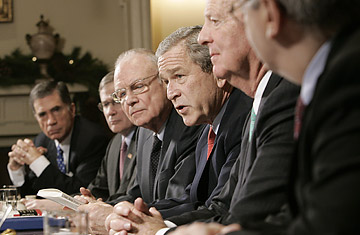
President Bush, center, speaks to members of the media following his meeting with the Iraq Study Group in the Cabinet Room of the White House in Washington, Wednesday, Dec. 6, 2006.
Press leaks before the release of the report tended to focus on two of the study group's recommendations: a phased withdrawal of American soldiers and increased diplomatic contacts with Iran and Syria. But as commission sources told TIME last week, those two proposals were only the tip of the iceberg.
The study group, which was chaired by former Secretary of State James Baker and former Indiana Congressman Lee Hamilton, came up with a whopping 79 recommendations. Some are bold strokes, such as engaging Iran and Syria in diplomatic dialogue "without preconditions" — which Bush has so far rejected. Others get down into weeds, like Recommendation 62, which suggests that meters be installed at both ends of oil pipelines to detect thieves siphoning supplies from the middle.
The recommendations come with no warranty. In fact, the commissioners acknowledged up front that they're not sure their ideas will work. "There is no path that can guarantee success," the report admits in its first paragraph. The best the commission can hope for is that "prospects can be improved." Three paragraphs down, the report concedes that its "recommended course has shortcomings."
But if changes aren't made soon in U.S. policy to reverse Iraq's deteriorating situation, the study group warns, the consequences could be apocalyptic: Iraq's government will collapse, likely sparking a "humanitarian catastrophe." Unfriendly neighbors such as Syria and Iran could intervene. The Sunni-Shi'a war in Iraq could spread to the rest of the Middle East. The global standing of the United States could plummet. And the American public, already divided over the war, could become even more polarized.
The report paints a far grimmer picture of Iraq than Bush has been willing to admit, and it repudiates many of his notions about what's sustaining the violence. Forty percent of Iraq's population of 26 million now lives in the "highly insecure" provinces of Baghdad, Anbar, Diyala and Salah ad Din. Bush blames the increasing violence on al-Qaeda, but the report notes that that the terror group is now responsible for only a "small portion" of it. The sectarian violence between Shi'a and Sunnis in and around Baghdad "causes the largest number of civilian casualties. Iraq is in the grip of a deadly cycle."
